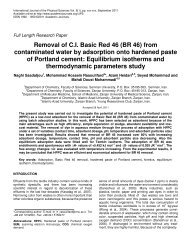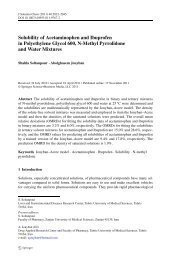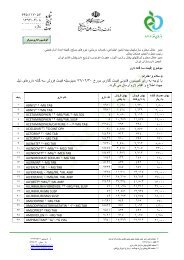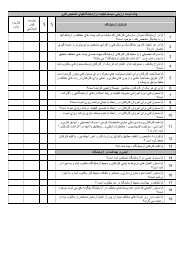new insights into the prevention and treatment of bulimia nervosa
new insights into the prevention and treatment of bulimia nervosa
new insights into the prevention and treatment of bulimia nervosa
You also want an ePaper? Increase the reach of your titles
YUMPU automatically turns print PDFs into web optimized ePapers that Google loves.
120<br />
4. Discussion<br />
New Insights <strong>into</strong> <strong>the</strong> Prevention <strong>and</strong> Treatment <strong>of</strong> Bulimia Nervosa<br />
At our knowledge, this is <strong>the</strong> first research investigating <strong>the</strong> relationships between <strong>the</strong><br />
development levels <strong>of</strong> interpersonal relatedness <strong>and</strong> self-definition <strong>and</strong> <strong>the</strong> clinical outcome<br />
<strong>of</strong> adolescents <strong>and</strong> young adults with an eating disorder. Two main findings should be<br />
highlighted: first, a less mature level <strong>of</strong> interpersonal relatedness at inclusion (as assessed by<br />
<strong>the</strong> Neediness sub-factor <strong>of</strong> <strong>the</strong> DEQ) was a significant predictor <strong>of</strong> <strong>the</strong> persistence <strong>of</strong> an<br />
eating disorder diagnosis at 3-year follow-up, independently from <strong>the</strong> severity <strong>of</strong> <strong>the</strong> eating<br />
disorder, which also appeared as a significant predictor. Second, a more mature level <strong>of</strong><br />
interpersonal relatedness (as assessed by <strong>the</strong> Relatedness sub-factor <strong>of</strong> <strong>the</strong> DEQ) appeared<br />
as a protective factor <strong>of</strong> a poor social outcome three years later. On <strong>the</strong> contrary, <strong>the</strong> severity<br />
<strong>of</strong> depression was a negative predictor <strong>of</strong> <strong>the</strong> social outcome, result that agrees with o<strong>the</strong>r<br />
studies from <strong>the</strong> literature (Godart et al., 2004). The o<strong>the</strong>r variables, such as <strong>the</strong> BMI, <strong>the</strong><br />
presence <strong>of</strong> binge eating behaviors or <strong>the</strong> o<strong>the</strong>r sub-factors <strong>of</strong> <strong>the</strong> DEQ at inclusion, had no<br />
direct influence over <strong>the</strong> clinical <strong>and</strong> social outcome <strong>of</strong> eating disorders.<br />
Personality factors have already been identified as significant predictors <strong>of</strong> diagnostic status<br />
<strong>and</strong> social outcome in eating disorders. For example, obsessive-compulsive personality traits<br />
have been repeatedly associated with poor diagnostic outcome in anorexia <strong>nervosa</strong> (Crane<br />
et al., 2007; Steinhausen 2009). Fur<strong>the</strong>rmore, impulsivity (Fichter et al., 2006) <strong>and</strong> low selfdirectedness<br />
(Rowe et al., 2011) have been related to poor outcome in <strong>bulimia</strong> <strong>nervosa</strong>.<br />
Results from our study add some interesting data from a developmental perspective<br />
showing that personality features reflecting <strong>the</strong> maturational level <strong>of</strong> interpersonal<br />
relationships may play a significant role in <strong>the</strong> outcome <strong>of</strong> eating disorders.<br />
There are several ways in which <strong>the</strong> developmental level <strong>of</strong> interpersonal relationships can<br />
negatively impact <strong>the</strong> clinical outcome <strong>of</strong> eating disorders: via <strong>the</strong> influence it exerts on <strong>the</strong><br />
clinical expression <strong>of</strong> <strong>the</strong> disorders <strong>and</strong> via <strong>the</strong> reduced efficacy <strong>of</strong> <strong>the</strong> <strong>the</strong>rapeutic<br />
interventions. As Blatt <strong>and</strong> coworkers have largely described (Blatt 2004; Zur<strong>of</strong>f et al.,<br />
1999b), <strong>the</strong> establishment <strong>of</strong> increasingly mature <strong>and</strong> satisfying interpersonal relationships is<br />
an essential component <strong>of</strong> personality development. Interpersonal relationships are<br />
dynamic systems that change continuously throughout development following a trajectory<br />
ranging from dependency to more mature expressions <strong>of</strong> mutuality <strong>and</strong> reciprocity,<br />
including intimacy. Flourishing relationships also allow a dynamic balance between focus<br />
on intimate relationships <strong>and</strong> focus on o<strong>the</strong>r social relationships (Fincham <strong>and</strong> Beach 2010).<br />
Subjects with an immature development <strong>of</strong> interpersonal relationships may feel less<br />
competent in social interactions <strong>and</strong> may experience <strong>the</strong>m as unpleasent <strong>and</strong> distressing.<br />
Investigations in samples <strong>of</strong> normal adolescents have shown that <strong>the</strong> Neediness sub-factor<br />
<strong>of</strong> <strong>the</strong> DEQ correlates negatively with measures <strong>of</strong> interpersonal competence (Henrich et al.,<br />
2001) <strong>and</strong> is associated to dysphoria, anxiety over loss, introversion, <strong>and</strong> discomfort with<br />
depending on o<strong>the</strong>rs (Zur<strong>of</strong>f et al., 2004). Intense separation distress is a common feature<br />
among eating disorders (Touchette et al., 2010) <strong>and</strong> many patients demonstrate marked<br />
separation anxiety when confronted to real or imagined ab<strong>and</strong>onments. High scores on <strong>the</strong><br />
Neediness sub-factor <strong>of</strong> <strong>the</strong> DEQ in eating disorders may reflect <strong>the</strong> disconfort <strong>of</strong> <strong>the</strong>se<br />
patients in social relationships (Zur<strong>of</strong>f et al., 1999a; Zur<strong>of</strong>f et al., 2004).<br />
A personality pr<strong>of</strong>ile characterized by high dependency may have direct implications for<br />
<strong>the</strong>rapeutic relationships in eating disorders. As pointed by Zur<strong>of</strong>f <strong>and</strong> colleagues (Zur<strong>of</strong>f et<br />
al., 2004), dependent people expect to be hurt in relationships <strong>and</strong> adopt submissive<br />
interpersonal style to forestall conflict <strong>and</strong> to elicit protection <strong>and</strong> support (Zur<strong>of</strong>f et al.,














![focuspdca.ppt [Compatibility Mode]](https://img.yumpu.com/22859457/1/190x146/focuspdcappt-compatibility-mode.jpg?quality=85)


